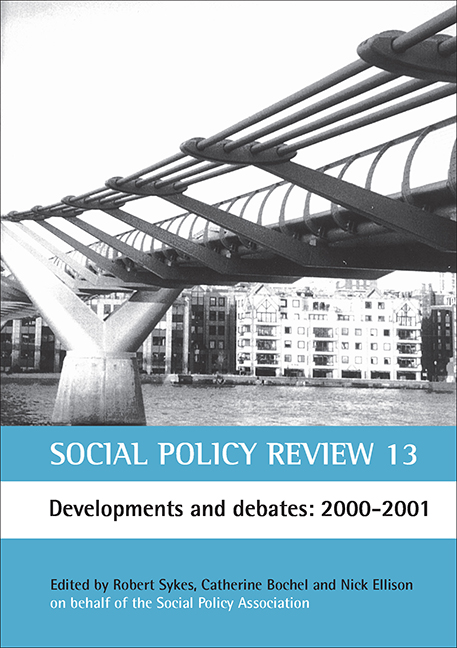one - The year in social policy
Published online by Cambridge University Press: 20 January 2022
Summary
Introduction
Over the last year, and as we enter the ‘real’ new millennium in 2001, a number of changes have been made to Social Policy Review (SPR). First, the Social Policy Association (SPA), which has been publishing SPR for 12 years, has entered into a partnership with The Policy Press to publish and distribute the Review. We are very enthusiastic about this development at the SPA since The Policy Press has a fast-growing reputation among academics and policy practitioners for the quality of its publications, and is at the leading edge of publishing topical and more reflective new work on policy issues. To mark this development, the Review has a new look, which we hope will become familiar to our existing readers in universities and elsewhere, and also become a symbol to old and new readers alike of high quality, incisive, polemical and interesting reading on developments in social policy, year by year.
Second, the editors have introduced some new features to the content of the Review. The first of these is this introductory chapter, ‘The year in social policy’, which the editors will use to cast a critical eye over selected developments in social policy in the last year (2000). To put such a time frame on historical and conceptual developments is not really possible, of course, and nor will we be able to cover all the developments that our readers may themselves have selected. So, while the introductory chapter will reflect the three main sections of the rest of the Review (UK developments, international developments, and conceptual and historical dimensions), the content and discussion will also reflect the particular slant on the past year’s developments and issues taken by the editors. It should not be seen as an attempt to summarise objectively what has happened in the previous year, but rather to provide further analysis and argument at a more general level to complement the more specific foci of the remaining chapters in the review.
Third, this year we have introduced short section introductions for each of the three parts of the Review, summarising the chapter contents and arguments, and providing the reader with a quick guide to what our various authors have to say.
- Type
- Chapter
- Information
- Social Policy Review 13Developments and Debates: 2000–2001, pp. 1 - 14Publisher: Bristol University PressPrint publication year: 2001



